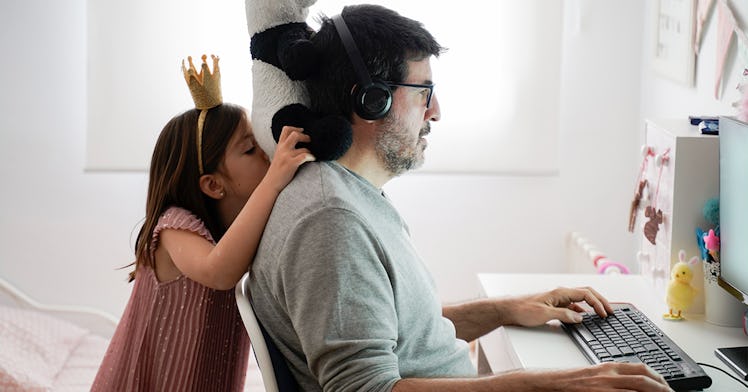New Data Proves Parents Can’t Actually Work From Home
A breakdown of why working remotely with kids is such a challenge

Time seems to pass differently now. Due to the coronavirus pandemic, many parents have fewer places to go, and yet the work doesn’t slow. In an article for The Washington Post, Suzanne M. Edwards and Larry Snyder, both university professors and parents to young children, wrote, “On most days, it feels as if we get a reasonable amount of time to devote to our professional tasks. And yet we are unable to concentrate enough to complete the work.”
Although Edwards and Snyder say that they have enough time to accomplish what they need to, successfully managing their newfound hybrid duties as full-time, do-it-all parents/working professionals/teachers has been a real challenge. So, they developed a system where each parent would rotate tending to the kids (dealing with sibling disputes, OK-ing snacks, answering questions) to allow the other to do academic work and then switch roles after a few hours, but they still found it difficult to actually get work done.
Why? The answer: Constant interruptions from their kids. To better understand their situation, Edwards and Snyder decided to conduct an experiment. One day, they created a spreadsheet and kept track of each time a parent was interrupted while doing work over a three-hour period. In that time, they discovered that the parent only really got two and a half hours of work time, with the kids interrupting for the other thirty minutes. The parent would be interrupted a total of 45 times (!!) during that period. The minute-by-minute breakdown is quite telling, too, with an average of 15 interruptions per hour, the longest uninterrupted time being just over 19 minutes, and the shortest only a few seconds.
From The Washington Post.
Edwards and Snyder concluded, “If our micro-experiment shows anything, it confirms what feminists have long known: Caregiving labor has to be done by someone, it will not take a back seat to caregivers’ other work responsibilities and it enables other labor that has historically been more highly valued.” Before, parents could often compartmentalize their tasks, with times of the day blocked off for work, school, soccer practice, etc., but now, many feel like they have to try to do everything at once, sometimes flailing and failing in the process. And as the pandemic illustrates, only a portion of that labor is actually paid.